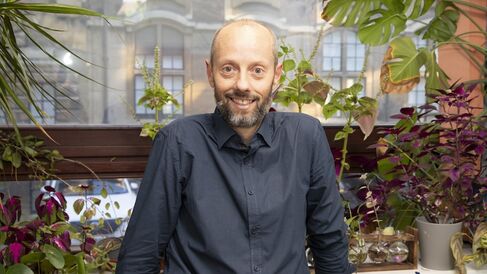Ross Waller

Investigating molecular function, diversity and evolution in cells.
It was amongst unicellular eukaryotes (protists) that complex cell architectures and compartmentalisation were developed that enabled larger and more sophisticated cells and cell behaviours. It is where endosymbiotic organelles were gained, redefining the metabolisms of eukaryotic cells. And it is where cell genomes developed packaging and organisational systems that enabled vast increases in genome size and complexity. Protists allow the study of all of these formative evolutionary processes that were essential to the development of animals and plants. But protists are also critical components of the modern world, contributing significantly to global primary production and food webs, and also as major parasites of humans, animals, plants and other organisms.
In the Waller Group we are investigating the subcellular organisations, molecular complexities, endosymbiotic partnerships, and genomes of diverse protists. In particular, we focus on the Infrakingdom Alveolata which is a strongly supported alliance of three disparate phyla: apicomplexans (intracellular parasites including Plasmodium and Toxoplasma), dinoflagellates (photosynthetic algae, essential coral symbionts, micro-predators and parasites), and ciliates (micro-predators and nutrient recyclers). These diverse but related models provide superb opportunities for studying the evolutionary processes that have shaped and defined eukaryotic diversity.
Research objectives
What are the adaptations seen in apicomplexan parasites that enable their successful exploitation of metazoan hosts (including us!)?
What are the molecular processes of endosymbiont establishment with their host cells?
How is chromatin managed without histones in dinoflagellates and how have their genomes responded to these changes?
What are the major cell biological innovations of dinoflagellates that contribute to their success as symbionts, such as with corals?
Key publications
Barylyuk K, Koreny L, Ke H, Butterworth S, Crook OM, Lassadi I, Gupta V, Tromer EC, Mourier T, Stevens TJ, Breckels LM, Pain A, Lilley KS, Waller RF (2020). A subcellular atlas of Toxoplasma reveals the functional context of the proteome. Cell Host Microbe, 28(5):752-766. doi: 10.1016/j.chom.2020.09.011
Waller RF, Kořený L (2017). Plastid Complexity in Dinoflagellates: A Picture of Gains, Losses, Replacements and Revisions, in Hirakawa Y (ed.) Secondary Endosymbioses, Vol 84, Advances in Botanical Research. UK: Academic Press, pp. 105-144. doi: 10.1016/bs.abr.2017.06.004
Gornik SG, Febrimarsa, Cassin AM, MacRae JI, Ramaprasad A, Rchiad Z, McConville MJ, Bacic A, McFadden GI, Pain A, Waller RF (2015). Endosymbiosis undone by stepwise elimination of the plastid in a parasitic dinoflagellate. Proc. Natl. Acad. Sci. U.S.A., 112(18):5767-5772. doi: 10.1073/pnas.1423400112
Katris NJ, van Dooren GG, McMillan PJ, Hanssen E, Tilley L, Waller RF (2014). The apical complex provides a regulated gateway for secretion of invasion factors in Toxoplasma. PLoS Pathog., 10(4):e1004074. doi: 10.1371/journal.ppat.1004074
Gornik SG, Ford KL, Mulhern TD, Bacic A, McFadden GI, Waller RF (2012). Loss of nucleosomal DNA condensation coincides with appearance of a novel nuclear protein in dinoflagellates. Curr. Biol., 22(24):2303-2312. doi: 10.1016/j.cub.2012.10.036
